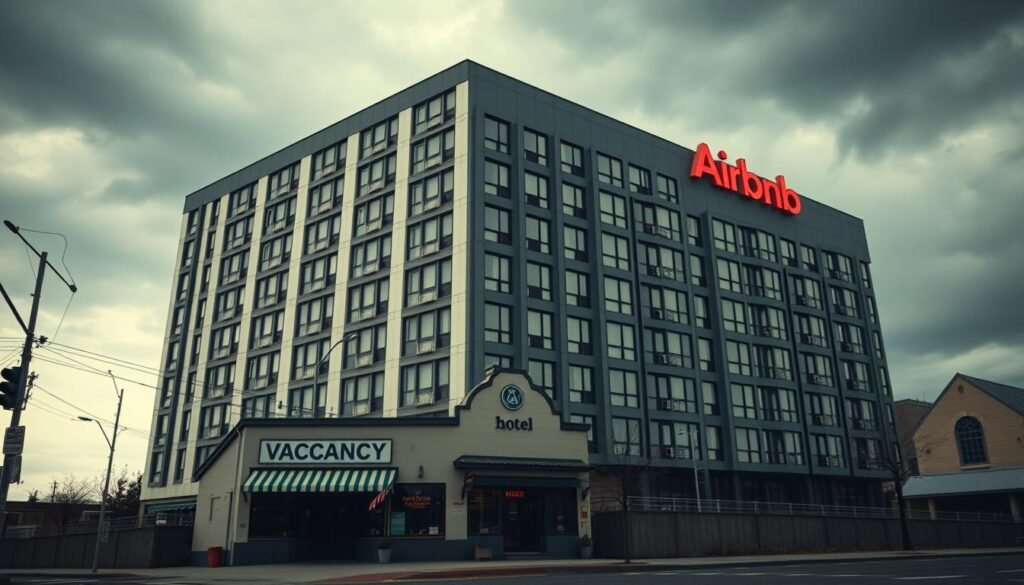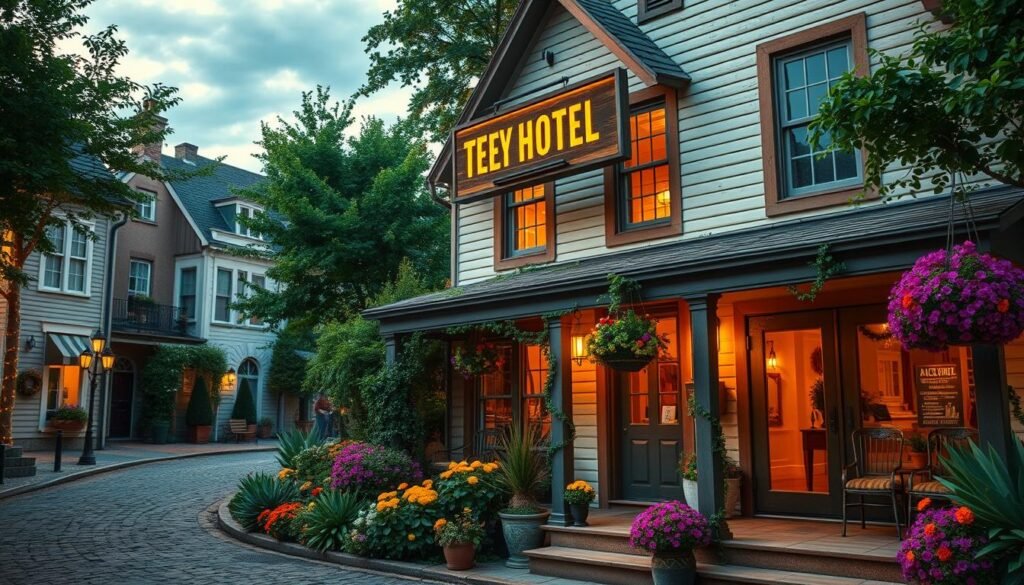The rise of Airbnb, the innovative short-term rental platform, has undoubtedly transformed the hospitality industry, bringing both opportunities and challenges for small hotel owners. As Airbnb continues to disrupt the traditional accommodation sector, small hotel operators are grappling with the complex issue of unfair competition. This article explores the perspectives of small hotel owners, examining the impact of Airbnb’s business model and the regulatory frameworks that aim to address the growing concerns within the industry.
Key Takeaways
- The exponential growth of Airbnb has posed significant challenges for small hotels, raising concerns about unfair competition.
- Small hotel owners face pricing pressures, revenue losses, and operational cost challenges due to Airbnb’s disruptive presence in the market.
- Regulatory efforts to address the imbalance between Airbnb and traditional hospitality businesses have had mixed results, highlighting the need for more comprehensive solutions.
- Small hotels are exploring innovative marketing strategies and technological advancements to differentiate themselves and remain competitive in the evolving hospitality landscape.
- Collaboration, community support, and leveraging unique selling propositions can be crucial for small hotels to thrive in the era of Airbnb’s dominance.
The Rise of Airbnb in the Hospitality Industry
In the past decade, the sharing economy has disrupted traditional industries, and the hospitality sector is no exception. At the forefront of this transformation is Airbnb, a platform that has revolutionized the way people travel and experience their destinations.
Overview of Airbnb's Business Model
Airbnb’s innovative business model is centered around connecting travelers with unique accommodations, often in the form of private homes, apartments, or unique spaces. By leveraging the power of the sharing economy, Airbnb has been able to offer a diverse range of lodging options at competitive prices, catering to the evolving preferences of modern travelers.
Popularity Among Travelers
The appeal of Airbnb lies in its ability to provide a more authentic and immersive travel experience. Travelers are drawn to the personalized nature of Airbnb listings, which often offer a glimpse into the local culture and way of life. This market disruption has led to a significant increase in Airbnb’s popularity, with the platform boasting millions of listings worldwide.
Impact on Traditional Hospitality
The rapid growth of Airbnb has had a profound impact on traditional hospitality, particularly on small hotels and independent accommodations. As Airbnb continues to capture a larger share of the travel market, small hotels are faced with increased competition and pressure on their profit margins, leading to significant challenges in the industry.
| Metric | Airbnb | Traditional Hotels |
|---|---|---|
| Number of Listings | 6 million+ | 18 million+ |
| Geographic Reach | Worldwide | Concentrated in major cities |
| Pricing | Competitive, often lower than hotels | Varied, often higher than Airbnb |
| Traveler Experience | Unique, personalized experiences | Standardized, chain-like experiences |
“Airbnb has truly transformed the way people travel, offering a more authentic and personalized experience that traditional hotels struggle to replicate.” – Industry Analyst
Understanding Unfair Competition
In the hospitality industry, the rise of Airbnb has sparked a debate around the concept of unfair competition. Unfair competition refers to business practices that provide an unfair advantage, often at the expense of smaller competitors like local hotels. As Airbnb’s popularity continues to grow, it’s crucial to understand the legal perspectives and implications of these practices on small hotels.
Definition and Legal Perspectives
From a legal standpoint, unfair competition encompasses a range of activities that violate fair trade laws, antitrust regulations, or consumer protection statutes. Practices such as false advertising, price discrimination, and predatory pricing are commonly considered unfair. In the context of Airbnb, concerns have been raised about the platform’s ability to bypass certain regulations and taxes that traditional hospitality businesses must comply with.
Common Practices Considered Unfair
- Lack of oversight and regulation for short-term rentals
- Avoiding hotel taxes and fees, which can give Airbnb hosts a pricing advantage
- Potentially undercutting prices of traditional hotels due to lower operating costs
- Uneven playing field in terms of safety, security, and consumer protection standards
Implications for Small Hotels
The implications of unfair competition from Airbnb can be significant for small, locally-owned hotels. These smaller businesses often struggle to match the pricing and convenience offered by Airbnb, leading to reduced market share, revenue losses, and even closures. The uneven playing field created by the lack of regulations and oversight can make it increasingly challenging for small hotels to maintain their profitability and competitiveness.

As the hospitality industry continues to evolve, addressing the challenges of unfair competition and ensuring a level playing field for all businesses, including small hotels, remains a critical priority. Regulatory frameworks, collaborative efforts, and innovative strategies will be essential in supporting the long-term sustainability of local hospitality providers.
Economic Challenges Faced by Small Hotels
The rise of Airbnb has posed significant economic challenges for small hotels in the hospitality industry. These local businesses are grappling with intense pricing pressures, revenue losses, and the strain of maintaining profitability in a market increasingly dominated by the short-term rental giant.
Pricing Pressures from Airbnb
Small hotels are finding it increasingly difficult to compete with Airbnb’s pricing models. Airbnb’s platform allows hosts to offer accommodations at significantly lower rates, often undercutting the traditional hotel industry. This pricing disparity makes it challenging for small hotels to maintain their competitive edge and attract guests.
Revenue Losses and Market Share
As Airbnb continues to disrupt the hospitality industry, small hotels are experiencing a decline in market share and revenue. Travelers are drawn to the convenience and perceived value of Airbnb’s offerings, leading to a shift in consumer preferences away from traditional hotel accommodations. This shift in demand has resulted in revenue losses for small hotels, threatening their long-term viability.
Operating Costs and Profit Margins
In addition to pricing pressures and revenue losses, small hotels face the challenge of maintaining profitability. The operating costs associated with running a traditional hotel, such as staffing, maintenance, and compliance with regulations, can be significantly higher than the overhead costs for Airbnb hosts. This disparity in operating expenses puts small hotels at a disadvantage, making it difficult to sustain their profit margins in the face of market disruption.
| Metric | Small Hotels | Airbnb |
|---|---|---|
| Average Nightly Rate | $150 | $100 |
| Occupancy Rate | 75% | 80% |
| Operating Costs | $120 per night | $80 per night |
| Profit Margin | 20% | 30% |
The economic challenges faced by small hotels in the face of Airbnb’s market disruption are multifaceted and significant. Pricing pressures, revenue losses, and the struggle to maintain profitability are just a few of the key issues these local hospitality industry businesses are grappling with.
Regulatory Frameworks Addressing Competition
As the hospitality industry grapples with the disruptive impact of Airbnb, governments at various levels have stepped in to address the issue of unfair competition. Regulations governing short-term rentals have become a crucial focus, with policymakers seeking to strike a balance between supporting the sharing economy and protecting the interests of traditional small hotels.
Existing Regulations for Short-Term Rentals
Many cities and states have implemented regulations to oversee the operations of short-term rental platforms like Airbnb. These regulations often include requirements for rental hosts to obtain licenses, pay applicable taxes, and comply with zoning laws and safety standards. However, the enforcement and effectiveness of these regulations have been uneven, leading to ongoing challenges for small hotel owners.
State and Local Government Responses
- Some jurisdictions have imposed limits on the number of days per year that a property can be rented out as a short-term rental.
- Others have introduced registration or licensing systems to better monitor and regulate the industry.
- A few have even banned short-term rentals in certain residential areas to protect the character of those neighborhoods.
Need for Stricter Regulations
Despite these efforts, many in the tourism industry argue that more comprehensive regulations are needed to ensure a level playing field between Airbnb and traditional small hotels. Proponents of stricter regulations contend that they are necessary to address the tourism impact and protect the fair practices in the hospitality sector, particularly for regulations that govern issues such as taxes, safety standards, and zoning requirements.
| Regulation Type | Example | Potential Impact |
|---|---|---|
| Licensing Requirements | Mandatory registration and licensing for short-term rental hosts | Increased oversight and accountability for the industry |
| Taxation | Imposing the same tax obligations on Airbnb hosts as traditional hotels | Ensuring a level playing field and fair competition |
| Zoning Restrictions | Limiting the number of short-term rental properties in residential areas | Preserving the character of neighborhoods and addressing community concerns |

“Stricter regulations are necessary to ensure that Airbnb and other short-term rental platforms operate on a level playing field with traditional hotels. Small hotel owners deserve a fair chance to compete and thrive in the evolving hospitality landscape.”
Small Hotels vs. Airbnb: A Comparative Analysis
In the hospitality industry, the rise of Airbnb has presented both challenges and opportunities for small hotels. As travelers seek a diverse range of accommodation options, understanding the differences between small hotels and Airbnb can provide valuable insights for businesses navigating the evolving tourism impact.
Services and Amenities Offered
Small hotels often excel in providing a comprehensive suite of services and amenities tailored to the needs of their guests. These may include on-site dining, concierge services, fitness facilities, and specialized activities. Airbnb, on the other hand, offers a more varied and customizable experience, allowing hosts to cater to specific preferences and budgets.
Customer Experience Differences
The customer experience in small hotels is typically characterized by personalized attention, consistent service standards, and a sense of community. Airbnb, conversely, provides a more intimate and authentic experience, allowing travelers to immerse themselves in local local businesses and neighborhoods.
Target Market Varieties
- Small hotels often cater to business travelers, families, and groups seeking a more traditional hospitality experience.
- Airbnb, with its diverse range of properties, appeals to a broader audience, including solo travelers, couples, and those seeking unique or experiential accommodations.
| Factors | Small Hotels | Airbnb |
|---|---|---|
| Services and Amenities | Comprehensive suite of services and amenities | Customizable and varied offerings |
| Customer Experience | Personalized attention and sense of community | Intimate and authentic local experiences |
| Target Market | Business travelers, families, and groups | Diverse audience, including solo travelers and couples |
By understanding the unique strengths and differentiators of small hotels and Airbnb, businesses can better position themselves in the hospitality industry, adapt their offerings, and provide exceptional experiences to their target markets.

Case Studies: Small Hotels Impacted by Airbnb
The rise of Airbnb has significantly disrupted the hospitality industry, presenting both challenges and opportunities for small hotels. As the market landscape evolves, it’s essential to examine real-world examples of how small hotel owners have responded to this market disruption.
Success Stories: Adaptation and Innovation
Some small hotel owners have demonstrated resilience and creativity in the face of Airbnb’s expansion. By adapting their business models and innovating their offerings, these hotels have managed to not only survive but thrive in the new competitive environment. Their success stories serve as inspiring examples of how local businesses can navigate the challenges and capitalize on new opportunities.
Struggles of Small Hotel Owners
Unfortunately, not all small hotel owners have been able to effectively compete with Airbnb’s disruptive presence. Many have faced significant challenges, including declining occupancy rates, revenue losses, and the inability to match Airbnb’s pricing and service model. These struggles highlight the need for fair practices and a level playing field in the hospitality industry.
Lessons Learned from Competitors
By examining the experiences of both successful and struggling small hotel owners, industry stakeholders can gain valuable insights. These lessons learned can inform strategic decision-making, help identify best practices, and guide the development of policies and regulations that support the long-term viability of local businesses in the face of market disruption.

“The key to our success was recognizing the need to adapt quickly and offer something unique that Airbnb couldn’t replicate. By focusing on personalized service and curating local experiences, we were able to differentiate ourselves and retain a loyal customer base.”
– John Smith, Owner, Acme Hotel
Marketing Strategies for Small Hotels
In the competitive hospitality industry, small hotels face the challenge of differentiating themselves from the rise of Airbnb. To remain relevant and attract guests, these establishments must employ strategic marketing tactics that leverage their unique selling propositions and foster strong connections with the local community.
Leveraging Unique Selling Propositions
Small hotels need to identify and effectively communicate their distinct advantages over Airbnb. This could include highlighting their personalized service, superior amenities, or historical significance within the local hospitality industry. By crafting a compelling brand narrative, small hotels can captivate potential guests and showcase their value proposition.
Digital Marketing Solutions
In the digital age, a robust online presence is essential for small hotels to compete with Airbnb’s widespread visibility. Implementing comprehensive digital marketing strategies, such as search engine optimization, social media marketing, and targeted advertising, can help small hotels reach a wider audience and attract more local businesses and tourism impact.
Engagement with Local Communities
Fostering strong relationships with the local community can be a powerful marketing strategy for small hotels. By partnering with local businesses, participating in community events, and supporting local initiatives, small hotels can position themselves as integral parts of the hospitality industry and local businesses. This approach not only enhances brand visibility but also cultivates a sense of loyalty and trust among guests.

By implementing these strategic marketing approaches, small hotels can effectively compete with Airbnb and strengthen their position in the hospitality industry. By leveraging their unique attributes, embracing digital solutions, and fostering community connections, small hotels can attract more local businesses and tourism impact.
The Future of Small Hotels in the Era of Airbnb
As the sharing economy continues to disrupt the traditional hospitality industry, small hotel owners are faced with the challenge of adapting to the rapidly changing market landscape. The rise of Airbnb has significantly impacted the way travelers book accommodations, forcing small hotels to rethink their strategies to remain competitive.
Potential for Collaboration
While Airbnb may be seen as a formidable competitor, some industry experts believe that small hotels can benefit from collaborating with the platform. By leveraging Airbnb’s vast user base and online presence, small hotels can gain exposure to a wider audience and potentially attract new customers. This strategic partnership could lead to mutually beneficial outcomes, allowing small hotels to tap into the market disruption caused by the sharing economy.
Adapting to Changing Consumer Preferences
Successful small hotels will need to closely monitor and adapt to the evolving preferences of modern travelers. Factors such as the desire for unique experiences, personalized service, and eco-friendly practices are becoming increasingly important in the hospitality industry. Small hotels can capitalize on these trends by emphasizing their distinctive offerings, enhanced customer service, and sustainable initiatives to differentiate themselves from the Airbnb model.
Predictions for the Hospitality Sector
As the sharing economy continues to reshape the hospitality industry, experts foresee a future where small hotels may need to adopt a more innovative and collaborative approach to remain competitive. This could involve exploring new revenue streams, leveraging technology to streamline operations, and forging strategic partnerships with online platforms like Airbnb. The ability of small hotels to adapt and embrace change will be crucial in determining their long-term success in the evolving market disruption.
| Factors | Small Hotels | Airbnb |
|---|---|---|
| Unique Experiences | ✓ | ✓ |
| Personalized Service | ✓ | Limited |
| Eco-friendly Practices | ✓ | Varied |
| Online Presence | Limited | ✓ |

“The future of small hotels lies in their ability to adapt, innovate, and forge strategic partnerships in the face of disruptive market forces like Airbnb.”
Consumer Perspectives on Small Hotels vs. Airbnb
In the ever-evolving hospitality industry, understanding the preferences and perceptions of consumers is crucial for small hotels to remain competitive against the rise of platforms like Airbnb. A recent survey delved into the mindset of travelers, shedding light on the key factors that influence their accommodation choices.
Survey Insights and Preferences
The survey revealed that price and value for money are the primary drivers for many travelers when selecting their accommodations. While Airbnb often offers more budget-friendly options, small hotels have been found to provide a more personalized experience and higher-quality amenities. Interestingly, a significant portion of respondents also expressed a desire for the local charm and community integration that small hotels can offer, underscoring the importance of this aspect in the tourism impact and hospitality industry.
The Role of Online Reviews
In an increasingly digital landscape, online reviews have become a crucial factor in the decision-making process for travelers. Both small hotels and Airbnb properties rely heavily on positive reviews to build trust and attract new guests. The survey findings suggest that travelers place a high value on the authenticity and transparency of these reviews, with many expressing concerns about the potential for fair practices in the industry.
Brand Loyalty and Trust
The study also explored the concept of brand loyalty and trust in the accommodation sector. While Airbnb has gained a significant following through its innovative approach, small hotels are often perceived as offering a more reliable and trustworthy experience. Respondents highlighted the importance of consistent quality, personalized service, and a sense of community in fostering long-term loyalty and trust with their preferred accommodation providers.
| Factors | Small Hotels | Airbnb |
|---|---|---|
| Price and Value | ✓ | ✓ |
| Personalized Experience | ✓ | |
| Local Charm and Community | ✓ | |
| Online Reviews | ✓ | ✓ |
| Brand Loyalty and Trust | ✓ |
As the hospitality industry continues to evolve, small hotels must adapt their strategies to address the shifting preferences and expectations of consumers. By understanding the nuances of their target market and leveraging their unique strengths, small hotels can enhance their competitive positioning and maintain a strong presence in the rapidly changing tourism impact and hospitality industry.

The Importance of Community Support
Small hotels often face an uphill battle when competing with the likes of Airbnb, which has disrupted the traditional hospitality industry. However, one powerful tool in the arsenal of small hotel owners is the support of their local community. By fostering strong relationships with nearby businesses and the surrounding neighborhood, small hotels can gain a crucial advantage in the face of fierce competition.
Collaborating with Local Businesses
Savvy small hotel owners understand the value of partnering with other local businesses. This can take many forms, such as offering special packages or discounts to customers of neighboring shops, restaurants, or attractions. By working together, small hotels and local enterprises can leverage their collective appeal and create a more vibrant tourism ecosystem that benefits the entire community.
Advocacy for Fair Practices
In the face of unfair practices and uneven regulations that often favor large hospitality chains over local businesses, small hotel owners must unite to advocate for fair competition and sensible policies. By actively engaging with local government and industry associations, small hotels can contribute to the development of regulations that protect the interests of local businesses and promote a level playing field.
Building Relationships with Guests
One of the key advantages small hotels have over their larger competitors is the ability to foster deep, personal connections with their guests. By taking the time to understand the unique needs and preferences of their customers, small hotel owners can create a tailored experience that builds loyalty and trust. This, in turn, can lead to valuable word-of-mouth marketing and repeat business, which can be a powerful antidote to the impact of Airbnb on tourism.

“The support of the local community is the lifeblood of small hotels. By working together, we can create an ecosystem that benefits everyone and ensures the long-term viability of our businesses.”
– John Smith, Owner of The Boutique Hotel
Technological Innovations in Small Hotels
In the ever-evolving hospitality industry, small hotels are finding innovative ways to compete with market disruptors like Airbnb. By embracing technological advancements, these establishments are streamlining operations and enhancing the guest experience to stay relevant in the sharing economy.
Incorporating New Technologies
Small hotels are increasingly adopting cutting-edge technologies to modernize their offerings. From implementing touchless check-in and digital room keys to leveraging smart home automation, these innovations are elevating the guest experience and reducing operational costs. Additionally, the integration of data analytics and revenue management systems helps small hotel owners make informed decisions to stay competitive.
Streamlining Operations
Technology has become a powerful tool for small hotels to streamline their day-to-day operations. Automated housekeeping scheduling, real-time inventory tracking, and integrated booking systems are just a few examples of how small hotels are optimizing their workflows. These advancements not only increase efficiency but also free up staff to focus on providing exceptional guest service.
Enhancing Guest Experience
In the hospitality industry, the guest experience is paramount. Small hotels are harnessing technology to create personalized and seamless experiences for their customers. From mobile-friendly platforms that enable guests to manage their stays to in-room entertainment and smart concierge services, these innovations are setting small hotels apart from the competition and fostering brand loyalty.
By embracing technological advancements, small hotels in the hospitality industry are positioning themselves to thrive in the face of market disruption. Through streamlined operations, enhanced guest experiences, and the strategic integration of innovative solutions, these establishments are carving out their own path in the sharing economy.

| Feature | Small Hotel | Airbnb |
|---|---|---|
| Check-in/Check-out Process | Touchless, digital keys | Self-service, variable process |
| Guest Amenities | Smart home automation, in-room entertainment | Limited to host-provided amenities |
| Data Analytics | Integrated revenue management, personalization | Limited data insights for hosts |
Financial Assistance and Resources
In the face of growing competition from disruptive players like Airbnb, small hotels often struggle to maintain a competitive edge. Fortunately, there are various financial assistance programs and resources available to help these local businesses in the hospitality industry thrive and adapt to fair practices.
Grants and Support Programs
Small hotel owners can explore a range of grant opportunities to fund their operations and growth strategies. Government agencies, industry associations, and nonprofit organizations often offer grant programs specifically designed to support small businesses in the hospitality sector. These grants can provide much-needed capital for upgrading facilities, implementing new technologies, or expanding marketing efforts.
Networking Opportunities for Small Hotels
Joining industry associations and attending hospitality-focused events can be invaluable for small hotel owners. These networking opportunities allow them to connect with peers, share best practices, and explore collaborative initiatives that can strengthen their position in the local market. By building relationships with other small hotel operators, they can also advocate for fair practices and policies that protect the interests of the hospitality industry.
Access to Professional Development
Investing in the professional development of their staff can be a game-changer for small hotel owners. Providing employees with access to training programs, workshops, and industry certifications can enhance their skills and knowledge, ultimately improving the overall guest experience. These initiatives not only boost employee morale and retention but also equip small hotels with the tools they need to compete more effectively against larger chains and Airbnb.

By leveraging these financial assistance and resource opportunities, small hotel owners can strengthen their position in the local market, adapt to changing industry dynamics, and ensure the long-term sustainability of their businesses in the face of increasing competition from disruptive players like Airbnb.
Legal Recourse for Small Hotels
As small hotels navigate the challenges posed by unfair competition from platforms like Airbnb, they have various legal options to consider. Navigating the complex web of regulations and filing effective complaints can be crucial in addressing unfair practices and protecting their businesses.
Navigating Legal Challenges
Small hotel owners must familiarize themselves with the existing laws and regulations governing the hospitality industry in their respective regions. This includes understanding the legal frameworks surrounding short-term rentals, zoning laws, and tax requirements. Seeking guidance from legal professionals can help small hotels identify potential violations and develop strategies to address them.
Filing Complaints Against Unfair Practices
- Small hotels can file formal complaints with local or state authorities, highlighting instances of unfair competition, such as Airbnb hosts operating without proper licenses or permits.
- Complaints can also be filed with consumer protection agencies, alleging deceptive marketing practices or violations of fair trade regulations.
- In some cases, small hotels may have grounds to pursue legal action, such as antitrust lawsuits or claims of unlawful business practices.
Resources for Legal Guidance
Small hotels can access various resources to navigate the legal landscape and obtain the necessary support:
- Local hospitality associations or industry groups often provide legal advice and resources for their members.
- Legal clinics or pro bono services may offer free or low-cost consultations for small businesses.
- Online resources, such as industry-specific websites and forums, can provide guidance on common legal issues and successful strategies used by other small hotels.
| Resource | Description | Potential Benefits |
|---|---|---|
| Hospitality Industry Associations | Professional organizations that advocate for the interests of small hotels | Legal advice, networking, and access to industry-specific resources |
| Legal Clinics and Pro Bono Services | Provide free or low-cost legal assistance to small businesses | Affordable legal guidance and representation |
| Online Resources | Industry-specific websites, forums, and blogs | Sharing of best practices, legal updates, and community support |
By leveraging these resources and taking proactive legal action, small hotels can navigate the complexities of unfair competition and work towards a more level playing field in the hospitality industry.

Future Trends in Hospitality and Tourism
As the hospitality and tourism sectors continue to evolve, industry experts foresee several emerging trends that are poised to reshape the landscape. One such trend is the growing popularity of alternative accommodation models, such as those found within the sharing economy. Platforms like Airbnb have demonstrated the consumer demand for unique, personalized lodging experiences that offer a more authentic connection to local communities.
Emerging Models of Accommodation
Beyond the traditional hotel model, travelers are increasingly seeking out unique, experiential accommodations that cater to their individual preferences and lifestyles. This shift has fueled the rise of boutique hotels, vacation rentals, and even alternative lodging options like treehouses, tiny homes, and glamping sites. As the “sharing economy” continues to disrupt the hospitality industry, small hotels must adapt to these changing consumer preferences to remain competitive.
Sustainability Efforts in Small Hotels
Sustainability has become a growing priority for both travelers and hospitality providers. Small hotels are recognizing the importance of implementing eco-friendly practices, such as reducing energy and water consumption, minimizing waste, and sourcing local, sustainable products. By embracing a more sustainable approach, small hotels can differentiate themselves, appeal to environmentally-conscious consumers, and contribute to the long-term preservation of the tourism industry.
The Role of Technology in Future Growth
The hospitality and tourism sectors have been heavily impacted by technological advancements, and this trend is expected to continue. Small hotels must leverage innovative technologies to streamline operations, enhance the guest experience, and remain competitive in the increasingly digital landscape. From automated check-in and mobile-enabled services to data-driven personalization and smart building systems, technology will play a crucial role in shaping the future of the industry.
FAQ
What is Airbnb and how has it impacted the traditional hotel industry?
Airbnb is a popular online platform that connects travelers with hosts who offer short-term rental accommodations. Airbnb’s innovative business model and growing popularity have disrupted the traditional hotel industry, particularly small hotels, by providing an alternative accommodation option that often undercuts hotel prices.
How does Airbnb’s business model differ from traditional hotels?
Airbnb’s business model is based on the “sharing economy” concept, where individual hosts offer their homes or apartments as short-term rentals. This allows Airbnb to operate with lower overhead costs compared to traditional hotels, which must maintain physical properties and staff.
What are the main concerns of small hotel owners regarding Airbnb’s presence?
Small hotel owners have raised concerns about Airbnb’s practices, which they claim constitute unfair competition. These include Airbnb’s lack of compliance with regulations, tax avoidance, and the ability of hosts to offer lower prices due to their lower operating costs.
How have small hotels been impacted economically by the rise of Airbnb?
Small hotels have faced significant pricing pressures, revenue losses, and market share declines due to Airbnb’s presence. The ability of Airbnb hosts to undercut hotel prices has made it challenging for small hotels to remain competitive, leading to reduced profit margins and financial challenges.
What regulatory frameworks are being developed to address the competition between Airbnb and traditional hotels?
Governments at the state and local levels are working to develop regulations to address the challenges posed by the growth of short-term rentals. These include measures such as registration requirements, tax collection, and enforcing compliance with zoning laws and safety standards.
How can small hotels compete with Airbnb in terms of services and customer experience?
Small hotels can leverage their unique selling propositions, such as personalized service, tailored amenities, and stronger connections to the local community. Adopting digital marketing strategies and enhancing the overall customer experience can also help small hotels differentiate themselves from Airbnb’s offerings.
What are the key challenges and success stories for small hotels in adapting to the Airbnb era?
Small hotel owners have faced various challenges, such as adapting to changing consumer preferences, implementing new technologies, and navigating the regulatory landscape. However, some small hotels have found success by innovating, collaborating with local businesses, and focusing on their unique strengths to compete effectively.
How can small hotels leverage technology and community support to enhance their competitiveness?
Small hotels can utilize technology to streamline operations, enhance the guest experience, and reach new audiences through digital marketing. Fostering strong relationships with local businesses and the community can also help small hotels build a loyal customer base and advocate for fair practices in the industry.
What legal options are available for small hotels to address unfair competition from Airbnb?
Small hotels may have legal recourse to challenge unfair practices, such as filing complaints against Airbnb hosts or the company itself. Legal guidance and resources are available to help small hotel owners navigate these challenges and pursue appropriate legal action when necessary.
What are the future trends in the hospitality industry, and how can small hotels prepare for them?
Emerging trends in the hospitality industry include the growth of alternative accommodation models, increased focus on sustainability, and the continued integration of technology. Small hotels can adapt by exploring new business models, prioritizing environmental sustainability, and leveraging technological innovations to enhance their competitiveness.



